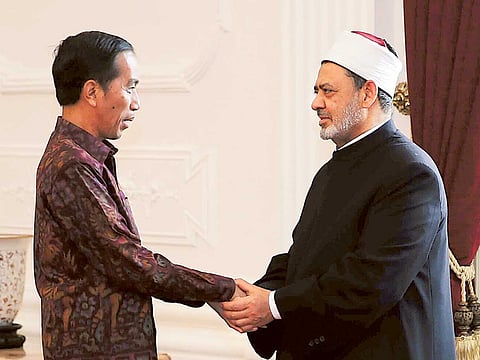Al Azhar urges tolerance between Muslim sects
Erroneous beliefs must be uprooted from education system and mosques, Grand Imam says

Jakarta: Dr Shaikh Ahmad Al Tayyeb, the Grand Imam of Al Azhar, on Monday urged more tolerance among different Islamic schools and doctrines, saying it was the best way to combat terrorism.
Speaking in Jakarta during a meeting of the Muslim Council of Elders and the Indonesian Council of Ulama, he said most of the wars taking place in Muslim countries today are a result of the Sunni-Shiite divide.
“The greatest challenge in the Muslim world is that differences among Muslim doctrines are not tolerated and rather lead to violence. Education has contributed to this mistake,” Dr Al Tayyeb said.
The Grand Imam of Al Azhar argued that to try to define a single and rigid Islam is a failure to understand the heterodoxy of the religion and the glory of the differences it encompasses.
“We have no objection to one believing in a school or doctrine, but no one can claim that he or she represents the true or authentic Islam,” Dr Al Tayyeb said.
The Grand Imam of Al Azhar said he did not differentiate between Sunnis and Shiites.
“All are Muslims unless any of them denies matters which every Muslim must know from Islam by necessity.
“The war that has destroyed Syria, Iraq and Yemen was caused by the Shiite-Sunni divide,” Dr Al Tayyeb said.
Dr Al Tayyeb said the erroneous beliefs some scholars espouse are passes on to school children.
“These erroneous beliefs must be uprooted from our education systems and our mosques,” Dr Al Tayyeb said.
He said that curricula in many Muslim countries contribute to extremist interpretations of Islam, stressing that new curricula must be developed to show Islam’s teachings of tolerance and peace.
The Muslim Council of Elders — an independent international body that aims to promote peace in Muslim societies — came to the rescue of Indonesia in the wake of the recent terror incidents, said Dr Ali Al Nuaimi, secretary-general of the council. He added the meeting was held on an invitation by Indonesian President Joko Widodo.
“The seventh meeting of the Muslim Council of Elders convenes in Jakarta to show support to this Muslim country and to face up to terror and violence in the Muslim world especially in Indonesia,” Dr Al Nuaimi said.
Multiple blasts and gunfire wreaked havoc in the Indonesian capital last month in what officials said were coordinated Daesh-linked terror attacks.
The council is the first institutional entity that gathers Elders of the Islamic nation, which was a result of the recommendations of the Forum for Promoting Peace in Muslim Societies.
Dr Al Nuaimi said the council’s meeting in Jakarta was of great significance to show the true values of Islam: justice, mercy, peace and tolerance.
The Council met the Indonesian Council of Ulama, the highest religious entity in the country. Dr Marouf Amin, Chairman of the Council of Ulama, said
Members of the Muslim Council of Elders will also meet scholars and hold lectures at universities to spread the true Islamic speech calling for mercy, peace and tolerance and to recover Islam from its hijackers.
Dr Kaltham Al Muhairi, a founding member of the council, said peace missions, whose prime goal is to visit hotspots as part of endeavours to resolve disputes by peaceful means, have been sent to many countries including France, Italy, Pakistan and South Africa.
The Muslim Council of Elders, set up in 2014, placed great emphasis on the impartiality of any subjective factors which make the members of the Council a party to any political, religious or ethnic conflict.
Dr Al Muhairi stressed the need to comply with the provisions of Islamic teachings that calls for peace, rooting the concept of peace, and establishing the method of peace in fiqh (jurisprudence), values, concepts, rules and culture, making the path of peace a choice for the youth of the Islamic nation.
The aim of the council, which is based in Abu Dhabi, is to unify the efforts to reunite the Islamic nation and extinguishing fires that swept the region through extremist ideologies that are contrary to human values and principles of Islam.
Sign up for the Daily Briefing
Get the latest news and updates straight to your inbox



